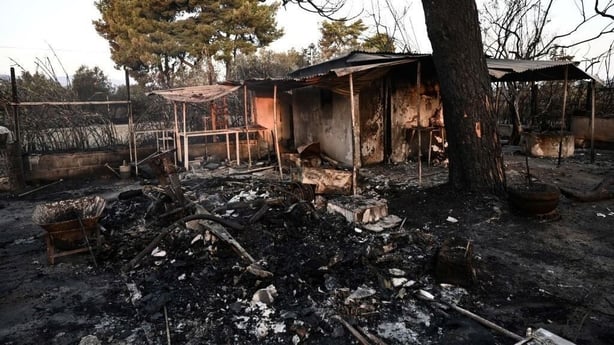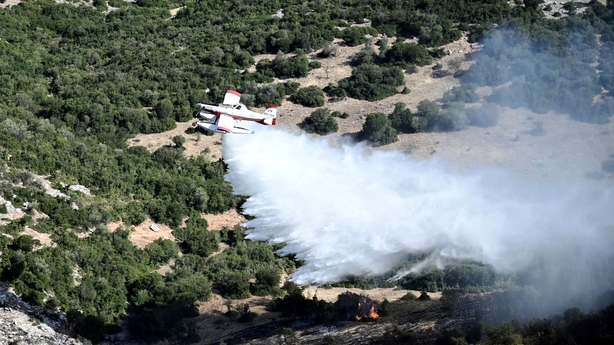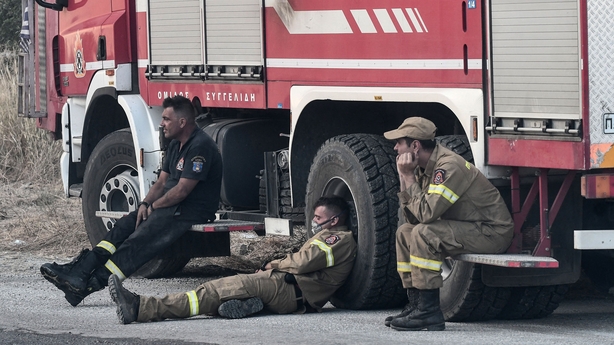Greek Prime Minister Kyriakos Mitsotakis has said the country needs to take more steps to combat the effects of climate change as wildfires that have raged for a fortnight continue to burn.
Five people have been killed in blazes supercharged by strong winds and temperatures exceeding 40C.
Since yesterday, officials have ordered the evacuation of several communities in Magnesia, a coastal area north of Athens.
More people were forced to move today, some via private speed boats, and head to the nearby port city of Volos, as flames rekindled.
Powerful explosions were heard from an ammunition depot in the coastal town of Nea Aghialos, Greek state television ERT reported.
It said the ammunition depot belonged to the Greek air forces. There are no immediate reports of injuries.
"There were dozens of blasts which caused glass windows to shatter, people got panic," mayor of the nearby port city of Volos, the regional capital, Achilleas Beos told Open television.
Greek fire brigade spokesperson Ioannis Artopoios said that firefighters made a "superhuman effort" but failed to tame the rekindling blazes in the wider area of Volos and in Aghialos.
The fire service said that more than 500 blazes have burned across the country so far this year.
The vast majority were tackled before they could pose a threat, according to the government.
While summer outbreaks are common in Greece, scientists say higher temperatures and dryer weather are turning it into a Mediterranean hotspot for climate change.
Mr Mitsotakis said Greece needed to reform its fire fighting and fire prevention policies and do more to alleviate the impact of climate change.
"The climate crisis may be a reality, but it cannot be an excuse," he said during a meeting with President Katerina Sakellaropoulou.
"Our country ought to take more steps ... to be ready to mitigate, as much as possible, the effects of a reality that we are already starting to feel, and that could have dramatic effects on many different aspects of our economic and social life," he said.
Since yesterday, officials have ordered the evacuation of several communities in the hard-hit area of Magnesia, a coastal area north of Athens.
The fire service said that 74 firefighters were injured, or suffered heat stroke, while battling the blazes over the past ten days.
Today "the risk of a fire is extreme in several areas. We remain in a state of alert," spokesperson Ioannis Atropios said.
In Sesklo, a village near the coastal port city of Volos, the regional capital, the blazes destroyed farms and killed animals while flames threatened the industrial zone of the city.
The labour ministry urged employers in the area to suspend operations.

Drone footage above Volos showed the fire leaving behind a trail of destruction with charred trees and land covered in grey ash.
The fire in Kymi on the island of Evia, where two pilots were killed on Tuesday when their plane crashed into a hillside as it was dropping water onto the flames, was brought under control.
Rekindlings in the north of Corfu island and near the town of Lamia, south of Volos, were tamed.
On Rhodes, where more than 20,000 foreign visitors and locals fled seaside hotels and homes over the weekend, teams were trying to put out a blaze in a hard-to-reach mountainous area on Thursday.
Drone images show swathes of scorched forest land from a mountain down to the coast.
Large areas of the Mediterranean have sweltered under an intense summer heatwave in recent days, and firefighters have been battling to put out blazes across the region, from Portugal to Sicily to Croatia to Algeria.
Some 34 people have died in Algeria, where homes have been destroyed and vast forest areas reduced to scorched wastelands.

In Italy, three people died as a result of the fires earlier this week, with investigations under way into a potential fourth victim, after a 61-year-old woman was found dead in a lift stuck for several hours in Palermo, potentially because of an electricity blackout.
Officials on Sicily reported an easing of the situation in some areas this morning, although the regional government has declared a state of crisis following days of high temperatures and fires.
Sicily's civil protection agency estimates the fires "have caused more than €60 million in damage".
Italian Prime Minister Giorgia Meloni's government has approved €10m to compensate tourists whose trips to Sicily have been disrupted by the fall-out from the heatwave.
This includes those affected by the closure of Catania airport, which suffered a fire in the main terminal on 16 July and has been offering only a vastly reduced service since then.
Catania and surrounding areas have also suffered blackouts and water shortages in the past week that electricity suppliers blamed on heat damage to underground cables.

Scientists from the World Weather Attribution group said this week the heatwaves that have hit parts of Europe and North America this month would have been almost impossible without human-caused climate change.
The office of the European Union's Commissioner for Crisis Management said that almost 500 firefighters and seven planes had been deployed to different areas in Greece.


